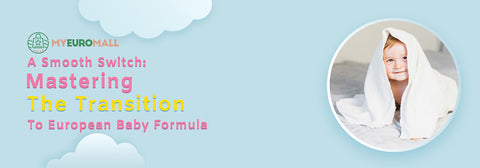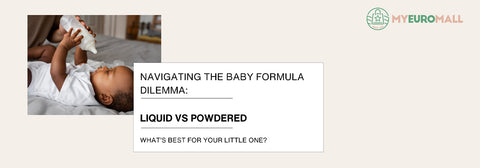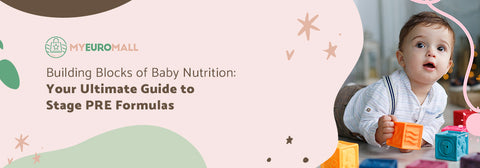As parents, you're constantly striving to make the best choices for your little ones, especially when it comes to their nutrition. Whether it's breastfeeding or opting for formula, the health and well-being of our babies are paramount. However, circumstances arise where transitioning to a different formula becomes necessary. If you're considering switching to European baby formula, rest assured you're not alone. In this guide, we'll delve into why parents might switch formulas, why European formulas are gaining popularity, and how to make the transition as seamless as possible.
Reasons to Switch Baby Formula

Various factors can influence the decision to switch your baby's formula. Here's a list of a few of them:
- Switching from Non-Organic to Organic Formula
Many parents are choosing to switch from non-organic to organic baby formula due to concerns about harmful chemicals and additives. Making the switch to organic formula can provide peace of mind regarding the ingredients your baby consumes.
- Not Meeting Your Baby's Nutritional Needs
One of the primary reasons parents consider switching baby formulas is if they feel their current formula isn't meeting their baby's nutritional needs. Every baby is unique and may have different nutritional requirements. In case you notice signs that the current formula isn't suiting your baby well, such as digestive issues, fussiness, or inadequate weight gain, it might be time to switch to a different formula that better meets their needs.
- Switching Between Powder and Ready-to-Feed Types
Many parents choose to switch formula types based on convenience, cost, and availability, whether you're transitioning from ready-to-feed liquid to powder formula or vice versa. At the same time, convenience and ease of preparation can also influence formula choice. Parents may opt to switch between powder and ready-to-feed formulas based on their lifestyle, travel plans, or the baby's feeding preferences.
- Advised by a Pediatrician to Switch Baby Formula
Pediatricians are invaluable resources for infant care, and they may recommend switching formulas based on your baby's specific needs or health concerns. Trusting their expertise can guide you in making the best choice for your baby's well-being.
- Personal Choice to Switch
Ultimately, the decision to switch baby formulas is a personal one. Whether you're looking for a formula with better ingredients, superior taste, or stricter safety standards, there are many compelling options for parents seeking the best for their little ones.
Why Choose a European Formula for Your Baby?

European baby formulas offer a host of benefits that make them an attractive choice for discerning parents. From superior ingredient quality to environmentally conscious practices, there are several reasons to opt for European formulas:
-
Organic Ingredients: European formulas mostly feature organic ingredients, free from pesticides and synthetic additives, offering a more natural and wholesome option for your little one. These are sourced from biodynamic farms, ensuring that your baby gets the best possible start in life.
-
Strict Regulations: European Union regulations governing infant formula production are among the most stringent globally, ensuring the highest levels of safety and quality.
-
Sustainability: Many European infant formula brandsprioritize sustainable practices, from eco-friendly packaging to responsible sourcing, aligning with parents' desire to minimize their environmental footprint.
-
Nutritional Excellence: European formulas are formulated to mimic breast milk as closely as possible, providing essential nutrients for healthy growth and development.
Tips for Smooth Transition to European Baby Formula

Transitioning your little one to a new formula can be a delicate process, but with the right approach, it can be seamless. Here are some pro tips to help facilitate a smooth transition to European baby formula:
-
Gradual Introduction: Kick-start by introducing small amounts of the new European formula alongside your baby's current formula. Begin by replacing one feeding per day with the European formula, gradually increasing the frequency over several days. This gradual approach allows your baby's digestive system to adapt comfortably.
-
Observe Closely: Pay attention to your baby's cues during the transition period, noting any changes in appetite, digestion, or behaviour. This will help you gauge their response to the new formula.
-
Stay Consistent: Once you've fully transitioned to the European formula, stick with it to give your baby's digestive system time to adapt. Consistency is key to a successful transition.
-
Seek Support: Don't hesitate to reach out to your pediatrician or a lactation consultant if you have any concerns or questions during the transition process. They can offer guidance and reassurance to help ease the transition for you and your baby.
My Euro Mall: Your Trusted Ally for European Baby Formula

At My Euro Mall, we understand the importance of providing your baby with the highest quality nutrition. That's why we're proud to offer a wide selection of European baby formulas, including HiPP and Holle baby formula . With our convenient online platform and fast, reliable one-click delivery tracking service, you can easily browse and purchase your preferred formula from the comfort of your home. We prioritize customer satisfaction and thus strive to ensure a seamless shopping experience for parents worldwide. Trust My Euro Mall to be your ally in providing your baby with the best European formula available.
In conclusion, transitioning to European baby formula offers numerous benefits for your baby's health and well-being. By following these essential tips and choosing a trusted provider like My Euro Mall, you can make the switch confidently, knowing that you're giving your baby the best nutrition possible.




